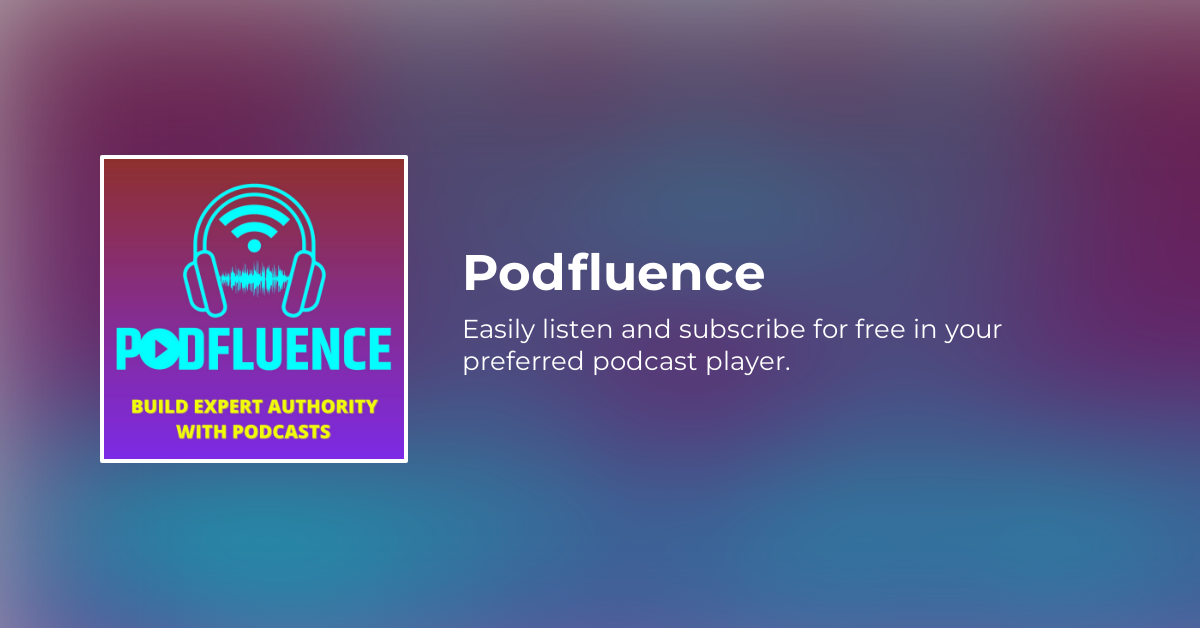Are You Staring At My Stats?

Hey, my eyes are up here!
It’s OK that you want to know how many people follow me online, listen to my podcast, buy my programs/books or have the faintest idea who I am. I don’t blame you. It’s normal, natural and maybe even validating at times. If you’re looking for a show to guest on or maybe even sponsor, you don’t want to waste your time on shows that only get about 5 to 20 downloads per episode, do you? Or… do you?
We’re back to our series on the 7 deadly sins of podcasting with number 4: vanity. It seems perhaps most useful here to look at vanity metrics and how much they matter or should matter and we’ll also steer into personal presentation vanity, both the good and the bad.
The sins so far then:
All the way back in episode #107 of Podfluence (when it was still Speaking Influence) I chatted with reluctantly titled influencer Whitney Lauritsen about the power of influencer marketing through podcasts and one of the things that came up there was that even though Whitney has large following by many people’s standards, some big potential sponsors take a look at her metrics and walk away. She rightly points out that they are missing something fundamental: she has a smaller audience than some influencers in her space but her audience is highly engaged and the majority of much larger audiences are not.
I regularly speak with podcasters who have pretty small followings. Heck, I am one of those people myself, but I can only agree with Whitney that I would prefer to have an engaged smaller audience than a disengaged large audience. The same thing came up in my conversation with Bob Gentle (#150) that his show is a success because it positions him well in his market and has given him the ability to connect with some amazing people. He actually doesn’t care so much about the size of his audience, just about making a good show that’s valuable for the audience he has.
Podcasters often get too focused on vanity metrics when the real treasure is in the quality of the content and the engagement of the audience, especially for shows that are not purely entertainment based. The reality is, if you are a podcaster who has 20 or fewer downloads per episode, your audience is most likely people who already know you, not people who just found you. That doesn’t necessarily mean that a small audience is not still valuable to you unless it really is just your auntie and a few friends tuning in.
The desire to get into the top billboards of podcasting is something that may actually prevent many podcasters from ever achieving that. Allow me to explain… Most new podcasters who start shows primarily for brand marketing are trying to go from zero to Joe Rogan overnight and they are only going to view success as nipping at the heels of top podcasters but that is unattainable for most people.
Take someone like Jordan Harbinger, host of The Jordan Harbinger Show, who did not start off with an eponymously titled show. Jordan earned his podcasting stripes with shows like The Art of Charm, which still runs now but without Jordan. He achieved a level of notability that allowed him to put his name in the title, even if you haven’t heard of him, although I highly recommend checking out his show.
Trying to go directly for a top podcast spot when you have no experience and no industry or celebrity status is close to impossible. It relies on the idea that people will listen in to hear the individual and their ideas and possibly reflects the level of unearned self-importance that social media has cultivated in many people thinking their thoughts and comments on anything are of any import or relevance to anyone outside their social circle.
Those who are willing to go through the lengthy process of learning how to be a good show host and how to give an audience in a particular area/genre what they want are far more likely to succeed but few people want to take the slower road, which is why so many people start shows and don’t get past 7 episodes because their illusion of instant podcast fame and audience just doesn’t happen. The rude awakening many people get in life outside social media is that no one is eagerly awaiting your opinion and for the most part, no one cares about your hot takes, you’re just pissing in the wind, shouting into the void.
I’ve given talks around the world on why business coaches and speakers should appear on podcasts and should probably start their own podcast too and there is one question I always get asked, which is about monetization. How do you monetize a podcast? Well… how do you monetize any business? Make a good product that people will want to buy. If you apply that same philosophy to podcasting, you’re on the right track. Being on podcasts, similarly to public speaking, requires you to hone your craft so that people will want to listen to you and would even pay to hear you speak. The show-up and wing-it strategy is for amateurs. Prove me wrong.
When you step onto a stage to speak you cross what some call the expert threshold. Perhaps because so few people are willing to put themselves in the position of being the person on the stage speaking? Perhaps it is like giving more gravitas to things we read than to things we hear. We work on many assumptions, one of which is that people who get up on a stage to speak know what they are talking about and have a certain level of credibility to be allowed on the stage in the first place.
New public speakers are often quite earnest and sincere, especially when their subject is scientific or highly professional but professional paid speakers will generally be able to tell you that the key to success as a speaker is to make sure you entertain as well as educate. Jeremy Nicholas in #59 said very well that you need to be able to make people laugh if you want to get well-paid as a speaker. How much of that do you ever hear from any podcast guests?
William Shakespeare knew well enough that even the deepest tragedy requires some comic relief. Even if our subjects are dry or super serious, people can’t and often don’t want to deal with that level of intensity for too long. I think this is a part of the reason why so many comedy/satirical news shows have done so well over recent years because we are more willing to be educated about serious topics when they are packaged as entertainment rather than as a serious documentary. My guest Lee Carter, on my latest episode of Podfluence, speaks to this a little in terms of how intensity tends to push people away and put up their defences, whereas lightness and humour are more likely to draw people closer and open up a channel of communication.
You don’t need to be a laugh riot all the time but you’re going to be remembered more and liked more if you are able to raise a few smiles and laughs in your media appearances. If your goal is to become something of a media personality in your area, this is going to be essential. It may take time to develop the skills and confidence to do this well but that is hopefully what you’re here for, to get into that process knowing that there is no magical shortcut or instant fix.
What about your visual image then? Even though most podcasts are audio only, many record with video and will use clips to promote the show. This does mean you should not show up to record in your dressing gown and pyjamas. Your professional image should be maintained as much as possible, even if the only person who sees you live is your guest or host. This does not mean that you need to be in business attire the whole time unless that is your professional image, even then, you can probably safely move to a more casual version of it.
When it comes to how we publicly present ourselves, we do at least need to show that we make an effort to look our best. For me, that usually means brushing my hair and beard, wearing my work clothes (smart casual), blotting the excess oil from my shiny forehead and making sure I am regularly well-groomed. For you, the routine may be a little different but it should be a routine.
I present myself in my media profiles as someone who is not overly serious and likely to be a fun guest or interviewer. My pal Annie Ruggles does this incredibly well to the point where people generally know they are going to have a great experience being a guest on her show or having her as a guest on theirs. Your ability to entertain is going to be directly relatable to your desirability as a guest even if you are a known thought leader, although being a well-known expert does somewhat lessen the need to also be entertaining but it’s still a good idea.
One of my favourite examples of someone hitting the perfect blend between education and entertainment is the Ted talk from the late Sir Ken Robinson called Do Schools Kill Creativity which I highly recommend watching if you haven’t seen it before. His talk is memorable because of the humour and his serious points are far more palatable when served in an entertaining format. In fact, we barely notice the seriousness at all but we should consider the incredible contrast of going from humour to seriousness to make a point. It creates a powerful moment and you have the potential to make moments like that too.
The latest Podfluence episode is about persuasion, a topic that is at the heart of everything I created the show to be about and I am incredibly fortunate to have Lee Carter, author of Persuasion: convincing others when facts don’t seem to matter, as my guest. Lee is a president and partner at Maslansky & partners in New York, a communications company that specializes in the uses and importance of language as you will come to understand from this episode, the words we use and the ways we approach communication really do matter.
Are you wondering what 5, 6 and 7 will be in the 7 deadly sins of podcasting? Make sure you’re subscribed to find out and to get all the latest updates on the Podfluence podcast. Also coming very soon is my holiday special show with the incredible Simon Lancaster as we discuss his new book Connect. Don’t miss it!

